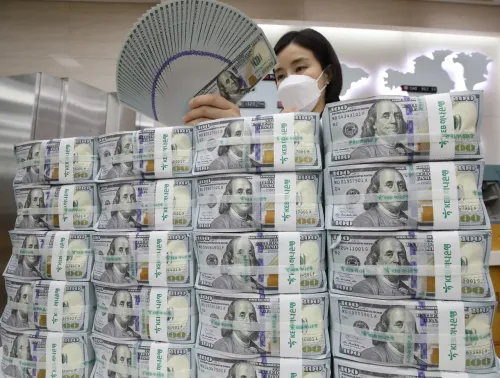Tata Motors Shares Decline Over 5% Following US Auto Tariff

Synopsis
Key Takeaways
- Tata Motors shares dropped by 5.47%.
- New 25% tariff on non-U.S. manufactured cars.
- U.S. market accounts for 22% of JLR sales.
- Management remains optimistic about 10% EBIT target.
- Investors are cautious due to tariff uncertainties.
Mumbai, March 27 (NationPress) Shares of Tata Motors Limited, the parent organization of luxury car manufacturer Jaguar Land Rover (JLR), experienced a significant drop on Thursday after US President Donald Trump declared a 25 percent tariff on automobiles that are not produced within the United States.
The stock price fell by 5.47 percent, or Rs 38.75, closing at Rs 669.5 on the National Stock Exchange (NSE).
This announcement was part of Trump's broader strategy to implement reciprocal tariffs on various nations, with the new car tariffs set to commence on April 2. This has raised alarm among automakers with considerable exposure to the US market.
The US represents a vital market for JLR, contributing nearly one-third of its total sales in 2024.
As per the company’s annual report, 22 percent of JLR's total sales originated from the US, making it a critical revenue stream for the brand.
Most JLR vehicles sold in the US are predominantly manufactured in the UK and other international facilities, all of which will now be subject to the 25 percent tariff.
The ramifications of these new tariffs on the company's financial performance are still unclear, leading to fluctuations in Tata Motors stock.
Despite the recent slump, the management of the company has maintained a positive outlook. Tata Motors has recently confirmed that JLR is on track to achieve its fourth-quarter target of 10 percent EBIT (earnings before interest and taxes) margins and plans to be net debt-free by the conclusion of the financial year.
These statements had previously aided the stock in rebounding from its 52-week low of Rs 606. Nevertheless, even with this recent recovery, the stock is still down by 40 percent from its all-time peak.
Numerous analysts believe that the unpredictability surrounding tariffs is causing investors to be cautious. However, some argue that the significant correction in Tata Motors stock from its July 2024 high of Rs 1,179 has made the risk-reward ratio more appealing for investors.
“Approximately a fifth of the revenue from India’s auto component sector is derived from exports, with 27 percent directed towards the US market alone,” stated Anuj Sethi, Senior Director at Crisil Ratings.
He also noted that select automotive component manufacturers with US-based facilities might experience some compensatory benefits from enhanced capacity utilization.










